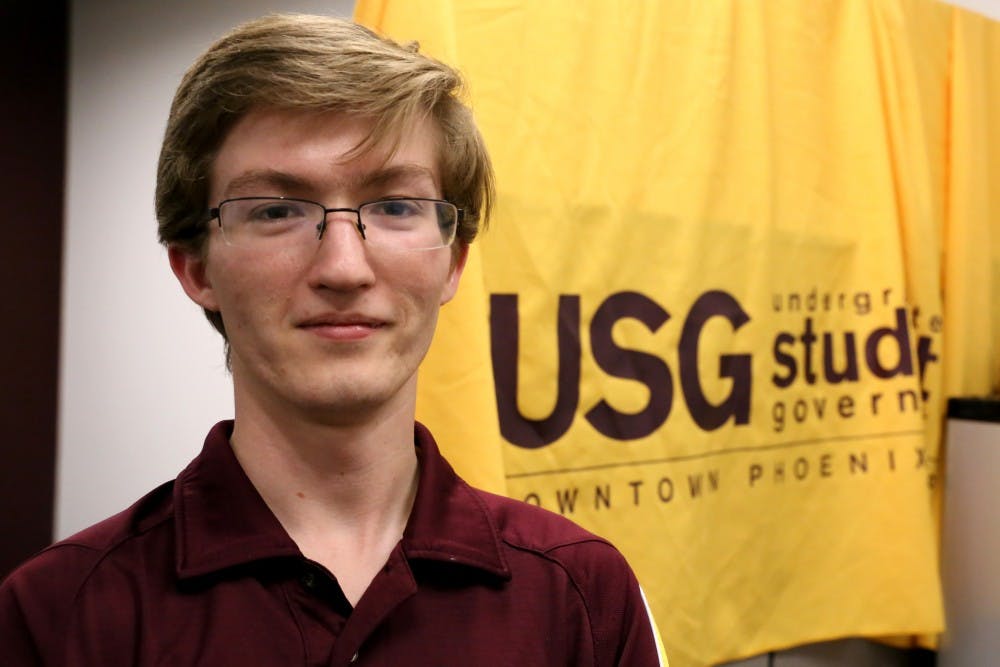An Undergraduate Student Government Downtown executive is filing a complaint with the Associated Students of ASU Supreme Court, claiming that the government's Council of Presidents has not been adequately transparent with its student body.
In his complaint, USGD Vice President of Policy Ryan Boyd has asked the court to rule whether the Council violated two sections of the USG Constitution by not allowing students to attend their meetings and not posting agendas within 24 hours of their meetings.
ASU's Council of Presidents consists of each USG president as well as the Graduate and Professional Students Association president.
In the complaint, Boyd cites Arizona legal code in regard to open meetings of public bodies, and though he recognizes that those laws do not technically apply to student government proceedings, he said USG modeled many of its policies after Arizona Revised Statutes (ARS) code.
The ARS is the official codification of Arizona's legislature.
He requests that the Supreme Court direct the Council to change its policies to comply with his interpretation of the USG Constitution.
"I have, with my personal time, decided to file a suit against the Council of Presidents, because, right now, we have a constitution that says they're supposed to do two main things: Put up minutes of their meetings ... and have open USG meetings, procedures and documents," Boyd said.
The Council conducts their meetings and votes behind closed doors, he said.
The discussion of transparency in the Council accompanies its review of two fees: the $75 student athletic fee and the increase of the student programming fee from $25 to $30.
"It seems interesting, given the fact that the Council of Presidents will recommend two fees ... both of those votes will go down behind closed doors, without any discussion," Boyd said. "They have the final say."
The Court, which despite being designed for purposes such as this, rarely sees use and has not yet been trained, Boyd said. So, litigation cannot actually occur until that happens.
Although USG is not governed by ARS code, if its meetings are modeled after it, Boyd could have a legitimate gripe, said David Wells, professor of political science at ASU.
"Generally, their meetings ought to be public," he said. "If a body does not meet in the open, they should have some degree of minutes posted."
However, in his reading, the USG Constitution does not explicitly specify that meetings need to be open to the public, though it does say that minutes should be posted within 24 hours of the meetings, Wells said.
The key legal basis of the complaint comes from several ARS codes that dictate meetings must be open with posted agendas, notices and minutes. The codes dictate that bodies can only go into private executive session for certain reasons and cannot make any final votes or decisions in those sessions.
As far as the USG Constitution is concerned, the crux of the issue comes from two sections. Title I, Article II dictates that all registered undergraduates with at least one credit hour are members of USG, and all members have the right to, among other things, open USG meetings, documents and procedures.
Second, the complaint cites Title II, Article II, Section 2, which requires minutes from Council meetings to be made public within 24 hours of the meetings, pending approval of those minutes "under the discretion of the official ASU professional staff advisor."
That being said, the extent to which the Council is anUSG body, and to how closely it must adhere to the USG Constitution in general — it consists of a graduate student representative — depends on how closely the USG Constitution is read.
At this point, the Council does not seem to be expressing any significant worry.
USGD president Corina Tapscott, who is a member of USG's Council of Presidents, said she feels the strength of Boyd's claim depends on how the USG Constitution is read. However, she said she can also see the opposite side.
"I think, most of the time, it's always good to have a conversation about transparency, just because that's usually what ends up being best for the students," she said. "I'm coming from the standpoint where ... we don't mean to be harming the students."
If the Court doesn't rule in Boyd's favor, Tapscott said it's possible the Council will still go to the students to see how they feel about having open or closed meetings.
The Council sometimes has discussions that would not be benefited by openness, like determining which act will play the Fall Welcome concert before the announcement is officially made, she said.
Isaac Miller, the president of Tempe USG, said he is not concerned by the complaint.
"I'm not strongly concerned with that issue right now, because the bigger issue is getting student feedback for the student programming fee and and for the benefits of the athletic fee," Miller said. "The bigger issue is also lobbying on behalf of the students at the State Capitol, so we don't get last year's budget cuts."
Miller said he feels the USG Constitution isn't definitive enough to say whether Boyd's claim is legitimate.
There are several things the Council is very comfortable sharing, but there are also some items, from an administrative perspective, that would not be benefited by being dispersed to the whole student body, he said.
"I am in no way concerned that we have not been transparent enough," he said. "I am not seeing complaints of a lack of transparency from really anyone I've worked with the entire year."
Reach the reporter at Arren.Kimbel-Sannit@asu.edu or follow @akimbelsannit on Twitter.
Like The State Press on Facebook and follow @statepress on Twitter.




